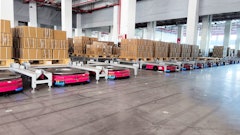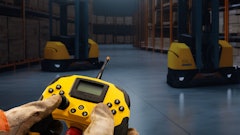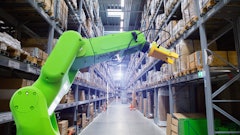
Supply chains are under increasing pressure to be faster, more transparent, and more resilient. Yet, many warehouses and logistics operations still rely on barcodes and QR codes—technologies that require manual scans and line-of-sight, often falling short in dynamic, high-volume environments. The result? Trillions in inefficiencies, preventable stockouts, unnecessary waste, and lost customers.
RAIN RFID has emerged as a transformative upgrade—automating real-time inventory tracking and enabling item-level visibility throughout the supply chain. But while traditional RFID systems are limited to identification, the next evolution is here: RAIN RFID enhanced with wireless energy harvesting.
This technology allows passive RFID tags to capture radio frequency (RF) energy from readers and use it to power onboard sensors—without batteries or wired power. That advancement turns simple ID tags into intelligent devices capable of sensing and reporting critical environmental data such as temperature, humidity, light, and motion.
From static ID to real-time intelligence
Traditional RFID tags provide basic identification. But supply chains don’t just need to know what an item is—they need to know where it is, how it's being handled, and whether it’s still within compliance thresholds.
With embedded sensors powered wirelessly, tags can monitor and report conditions throughout transit and storage. This is a breakthrough for industries that handle temperature-sensitive or fragile goods. For example:
· In cold chain logistics, where 20% of temperature-sensitive products are damaged before delivery, these smart tags provide early warning of temperature excursions.
· Light or motion sensors can detect tampering or movement in high-value or restricted items, flagging issues before they escalate into losses.
· In complex warehouse environments, tags with environmental sensing can help locate misplaced or mistreated items—especially in low-visibility or chaotic spaces where manual processes fail.
· Retail shrinkage—ranging from theft to process errors—costs U.S. retailers nearly $100 billion annually, with employee theft and internal mistakes making up two-thirds of losses. Enhanced tags help mitigate these risks through environmental context and usage data.
By turning RFID into a dynamic, real-time monitoring tool, organizations gain continuous visibility into product condition and location—without manual scanning or infrastructure-heavy systems.
Driving Compliance, Sustainability, and Circularity
Supply chains today face mounting pressure to balance the demands of compliance, sustainability, and circularity. Meeting ESG goals and adhering to increasingly complex regulations is no longer optional—it’s essential for businesses to thrive in a competitive and environmentally conscious market. Key regulations like the FDA’s Food Traceability Final Rule, the EU’s Digital Product Passport, and GS1 Digital Link standards are raising the bar. Businesses are now asked to go beyond basic item tracking, requiring detailed, ongoing environmental data collection and comprehensive end-to-end traceability for products.
This is where battery-free RFID tags with wireless-powered sensors step in as a game-changer:
· They drastically reduce e-waste: Batteries, which are a primary contributor to e-waste, generate an estimated 180,000 tons of landfill waste annually from consumer devices alone. By eliminating the need for batteries, RFID tags significantly cut down on hazardous waste and support a cleaner environment.
· They enable full lifecycle tracking: These tags provide seamless traceability across a product’s entire lifecycle—from raw material sourcing and manufacturing to in-use monitoring and end-of-life management. This level of insight facilitates reuse strategies, efficient recycling, and transparent environmental reporting, making it easier to adopt circular economy principles.
· They simplify audits and compliance reporting: With automatic logging and wireless storage of sensor data, these tags eliminate the need for manual data collection, reducing human error and streamlining compliance processes. Companies can easily meet regulatory requirements while saving time and resources.
In essence, battery-free RFID tags do more than enhance operational efficiency—they actively support sustainability goals. This technology empowers businesses to not only comply with stringent regulations but also take meaningful steps toward a greener future. It’s not just smarter—it’s more sustainable.
Smarter warehouse for omnichannel commerce
Inventory distortion—caused by overstocking and stockouts—remains a massive challenge for retailers, costing them a staggering $1.7 trillion globally just last year. This inefficiency doesn’t just impact profits; it also undermines customer satisfaction and loyalty. In today’s fast-paced retail environment, keeping inventory in check is more critical than ever.
RAIN RFID with wireless power harvesting is transforming inventory management by addressing these issues head-on, offering:
· Real-time stock updates across warehouses, stores, and e-commerce platforms, ensuring you always know what’s available and where it is.
· Enhanced order accuracy and faster fulfillment, reducing errors and meeting customer demands with speed and precision.
· Smart inventory alerts triggered by environmental or usage changes, helping you stay proactive in managing stock conditions.
· Predictive insights from environmental sensor data, enabling better storage optimization, spoilage reduction, and prevention of costly stockouts.
These advancements are especially crucial in omnichannel retail, where customers expect seamless experiences, immediate fulfillment, and flawless availability. By integrating smarter inventory solutions like RAIN RFID, retailers can bridge the gap between customer expectations and operational efficiency, unlocking new opportunities for growth and delivering a superior shopping experience.
The future of inventory is wirelessly powered
The future of supply chain operations is intelligent, connected, and sustainable—and RAIN RFID with wireless power is a foundational enabler. By going beyond identification, these enhanced tags unlock real-time visibility, environmental intelligence, and sustainable traceability.
With this technology, organizations can move from reactive to proactive: preventing spoilage before it happens, locating stock instantly, and responding to compliance issues in real time. They can also reduce environmental impact and enhance the accuracy of ESG data—all without adding operational complexity.
For logistics operators, retailers, and manufacturers, the question is no longer if they should upgrade their inventory systems—but how fast. Those who adopt now will gain a strategic edge in compliance, customer satisfaction, and operational efficiency—while laying the foundation for a data-driven, resilient supply chain.
RAIN RFID with wireless power isn’t just an upgrade. It’s the missing link to truly intelligent inventory.





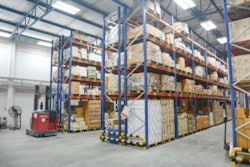
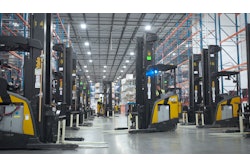

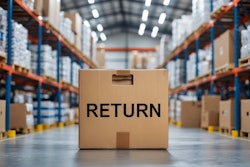







![Pros To Know 2026 [color]](https://img.sdcexec.com/mindful/acbm/workspaces/default/uploads/2025/08/prostoknow-2026-color.mduFvhpgMk.png?ar=16%3A9&auto=format%2Ccompress&bg=fff&fill-color=fff&fit=fill&h=135&q=70&w=240)
